必修一 Unit3 Trave Journal 导学案
- 格式:doc
- 大小:35.50 KB
- 文档页数:2
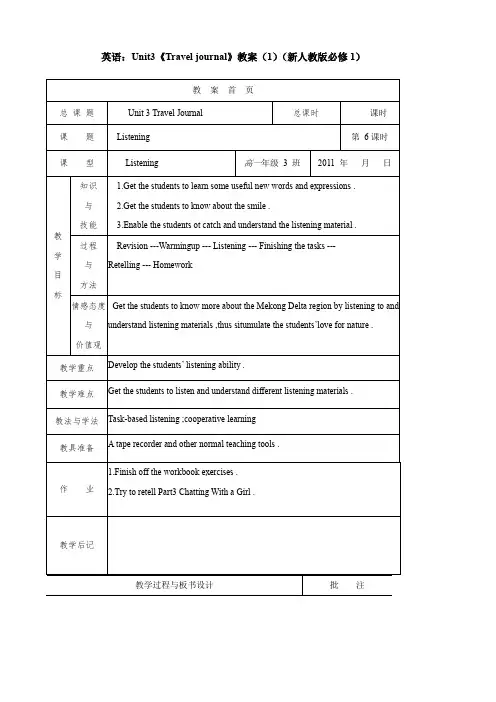
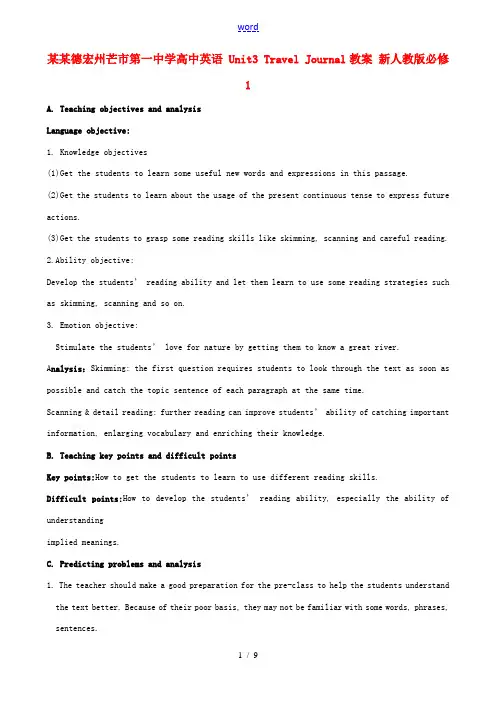
某某德宏州芒市第一中学高中英语 Unit3 Travel Journal教案新人教版必修1A. Teaching objectives and analysisLanguage objective:1. Knowledge objectives(1)Get the students to learn some useful new words and expressions in this passage.(2)Get the students to learn about the usage of the present continuous tense to express future actions.(3)Get the students to grasp some reading skills like skimming, scanning and careful reading.2.Ability objective:Develop the students’ reading ability and let them learn to use some reading str ategies such as skimming, scanning and so on.3. Emotion objective:Stimulate the students’ love for nature by getting them to know a great river.A nalysis:Skimming: the first question requires students to look through the text as soon as possible and catch the topic sentence of each paragraph at the same time.Scanning & detail reading: further reading can improve students’ ability of catching important information, enlarging vocabulary and enriching their knowledge.B. Teaching key points and difficult pointsKey points:How to get the students to learn to use different reading skills.Difficult points:How to develop the students’ reading ability, especially the ability of understandingimplied meanings.C. Predicting problems and analysis1. The teacher should make a good preparation for the pre-class to help the students understandthe text better. Because of their poor basis, they may not be familiar with some words, phrases, sentences.2. The teacher should introduce some reading skills properly so that it enables students to workout many questions of this passage correctly.3. The teacher must pay more attention to students’ feedback in the class and timely adjust.D. Teaching MethodsTask-Based Teaching Method, Group CooperationE. Teaching Aidsmultimedia, blackboard and question sheetF. Teaching proceduresWarming up -----Pre-reading(the first two have been done in the first period ) -----Reading -----post-reading -----Summary -----HomeworkG. Teaching ProceduresStep 1 Pre-reading1.Get the students first to look at some beautiful pictures of some places.After seeing those beautiful pictures; ask students “Do you want to travel?”As we all know that the National Day is ing, we will have a seven-day holiday. Where do you want to go on your holiday? And how are you going to get there?2.Review the means of transportationEg. bike\bus\taxi\subway\ship\airplane3.Give students four questions to make a dialogue:These four questions: (1) where are you going to visit?(2) When are you leaving?(3) How are you going to…?(4) Why do you want to go there by…?4.Pair workGive students two minutes to make their own dialogues by following thegiven example, and then check their work.Choose a student to make a new dialogue with teacher, the student ask questions,and the teacher answer the questions.5.Ask students “Do you know the LancangRiver?”6.Introduce something about the MekongRiver and look at the map, then list the countries thatthe MekongRiver flows through.These countries are: China\Laos\Myanmar\Thailand\Cambodia\VietnamDesigning purpose:Discussion enable students bee more activeStep 2 ReadingTask 1 Skimming: Read the whole passage and match each paragraph with the main idea.Para1 A.Different attitudes between themPara2 B. Take a great bike trip along the MekongRiver.Para3 C. The preparation before the trip & details about MekongRiver.Answer:1-B 2-A 3-CDesigning purpose:It helps studentscatch the main idea.Task 2 Scanning:Ask the students to read the passage carefully and decide whether the statements are trueor false and explain why.Finish the part in small groups and answer the questions in chorus.1)Dao Wei and Yu Hang belong to the Han nationality.2) Some of the Dai live in Western Yunnan.3)The MekongRiver is in China and it includes the LancangRiver.4)Although it is not easy to travel along the MekongRiver, Wang Wei insisted on doing so.5)The TibetanMountain where the MekongRiver begins is 5,000 meters high.6)The MekongRiver enters the North China Sea.Answer:F;T;F;T;F;FDesigning purpose:Seize the main information in a few minutes.Task 3 Detail reading:Read the passage and fill in the blanks. The exercise would be distributedto three groups and the students finish it in big groups.Answer:dream;Wang Wei and Wang Kun; cycle; properly;care about; on;valley; bends; meanders Designing purpose:Train students to be the best in searching for details.Step 3 Test for goalRead the passage again and do the multiple choices.(1) Which sentence is not true according to the text?A. Wang Wei advised Wang Kun to buy a mountain bike and he agreed.B. Wang Wei seldom listened to others.C. Before their trip they went to the library.D. Wang Wei knew the best way of getting to places.(2) From the text, we can infer that:A. Their trip will be difficult.B. Their trip will be very easy because they prepared a lot.C. They must successful after enough preparations.D. They know very well about the MekongRiver before.(3) The text tells us about:A. the author and her sister’s plan about their holidayB. anecdotes (轶事) that happened to their trip.C. the experiences during the author and his sister’s trip in Qinghai.D. the plan and the preparations for their tripAnswer:D A DDesigning purpose:It is used to evaluate students understanding of the whole text.Step 4 SummaryRetell the story by filling the blanks.(The teacher divide the class into two parts. The boys and the girls. They are supposed to do the summary in group discussion. The boys would be responsible for the first part while the girls the other. I’d like to invite a boy to read the paragraph and the rest give the answer. It is the same with the girls.)I am Wang Kun.Wang Wei is my sister.She is 1 ,but I am fond of her. 2 middle school,we have dreamed of taking a great bike trip.After 3 from college,we made our dream e true 4 .It was Wang Wei who 5 to cycle along the entire Mekong River from where it begins to where it ends and planned the 6 .Because she doesn’t 7 details,I told her something about the Mekong River and then we went to the library.The source of the Mekong River is at a(n) 8 of more than 5,000 metres in Qinghai Province.It passes through deep 9 ,travelling across western Yunnan Province.And when it enters Southeast Asia,its pace slows.It makes wide bends or meanders through low valleys to the plains.At last it 10 the South China Sea.AnswerDesigning purpose:Train the students’ summarizing ability.Step 5 HomeworkPlease read this passage loudly again and recite the key phrases and sentences during our class. Designing purpose:Let students have a good mand of understanding this text and try to remember some key words, expressions and sentence structure.Group A: Elementary exercises1.Read the passage again;2.Finish the exercises(which are on page 59 in Gaozhong Tongbu Ceshi Quanyou Sheji).Ⅰ.根据括号内汉语或首字母提示,用合适的单词填空1.We all decided to (组织)a concert for New Year.2.Jack (毕业) in physics from Stanford University last week.3.They went on a long train (旅行)across India.4.One major(不便之处)of the area is the lack of public transport.5.Although I admit he has many (缺点),I like him very much.答案:organize;graduated;journey;disadvantage;shortingsⅡ.请用下面方框中所给短语的正确形式填空1.Karen couldn’t whether to leave him or not.2.I have known him he was a child.3.My flight land at New York airport at 5 o’clock this afternoon.4.He nothing but money,not even his parents and friends.5.It is always the husband who first when a quarrel breaks out between the young couple.答案:make up her mind;ever since;is scheduled to;cares about;gives inGroupB: Consolidation exercises1.Read the passage again;2.Try to remember the key phrases and sentences;3.Finish the exercises(plus the exercises in group A)(which are on page 59-60 in Gaozhong Tongbu Ceshi Quanyou Sheji);Ⅲ.完成句子1.He is a strong-minded person,he never (向……低头) any difficulty.2.Owing to the recent bad weather,the project is several weeks (比预定时间晚).3.The old man insisted that I (take) his wallet and that I (go) to the police station with him.4.—I’m afraid that she won’t e to help me as she promised.—Don’t worry.Nothing will (改变主意) if she has(下定决心).5.—Is your father still smoking?—No.He (说服) to give up smoking one year ago.6.The programme (help) a number of poor students ever since it was founded.7.Elizabeth is only 1.52 metres tall,which will be very much (对她不利) if she wants to be a dancer.答案:gives in to; behind schedule; had take;go; change her mind;made up her mind;was persuaded; has helped; to her disadvantageGroup C:Enhancement exercise1.Read the passage again;2.Try to recite the key words and sentences;3.Finish the exercises(plus the exercises in group A&groupB)(which are on page 59-61 in Gaozhong Tongbu Ceshi Quanyou Sheji);4.Try to retell the story with your own words.阅读理解Whether you’re headed to another country for business or pleasure,it is likely that you nee d to keep in touch with your family or business partners in the United States.But if you plan to do that using your cellphone,you could have an unwele surprise—U.S.cellphones don’t work abroad.U.S.panies use different forms of technology,not like most of the international munity,including Europe.However,there is an easy,cost-effective solution to staying in touch while you’re travelling.You can rent a phone that is guaranteed to work in the countries you’re visiting.Roadpost offers a 30-day cellphone rental plan that includes free ining calls,free voicemail and call waiting services.The service is convenient and simple.You can place your order online and your phone will be shipped to arrive on the date you want.If an unexpected business trip es up,Roadpost can provide next-day delivery for most cities.In addition to the phone,Roadpost provides a spare battery,travel charger and a leather carrying case.When your phone is shipped from Roadpost,you receive an confirmation that contains yourinternational cellphone number so you can leave it with family members and business partners; Roadpost even provides business cards preprinted with your international phone number.Those who don’t want to be without while travelling can rent an international BlackBerry.It can be hard to stay in touch by when travelling.With an international BlackBerry,you can email as much as you like,without worrying about an expensive bill.If you’re travelling to very remote areas,you may want to consider renting a satellite phone:Because they receive their signals from satellites,these phones work anywhere on the planet,including oceans and mountains.When you return,simply ship the phone or BlackBerry back to Roadpost using the return kit the pany provides.1.According to the text,Roadpost probably is.A.an organization that offers some free servicesB.a person who offers some advice to foreign touristsC.a pany that rents cellphones to Americans going abroadD.a person who makes travel plans for Americans2.The first paragraph mainly tells us that .A.Americans need to change their cellphonesB.European form of technology is different from America’sC.U.S.cellphones don’t work abroadD.Americans who go abroad will meet an unwele surprise3.According to the text,it can be inferred that .A.an international BlackBerry is mainly used to sendB.Roadpost can offer cellphones using in different areasC.you should select a bag used to send your cellphoneD.Roadpost’s service is convenient and simple4.Which of the free services can you get from Roadpost?A.Voicemail.B.Sending .C.Shipping the phone back.D.Call waiting services.答案:CCBATeaching reflection:____________________________________________________________________________________________ ____________________________________________________________________________________________ ____________________________________________________________________________________________。
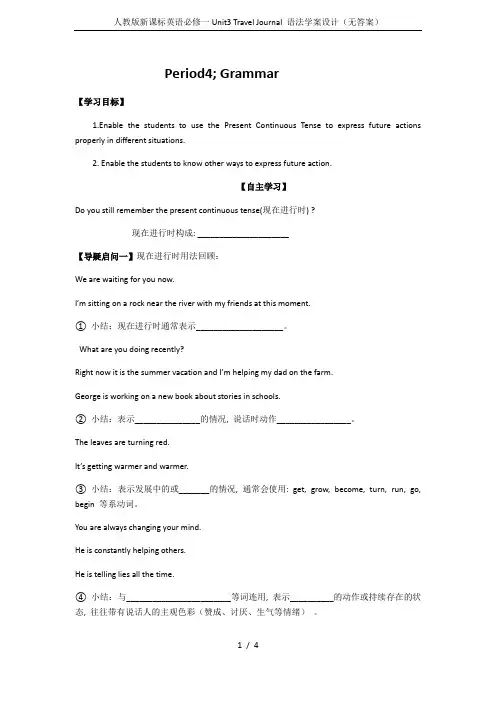
Period4; Grammar【学习目标】1.Enable the students to use the Present Continuous Tense to express future actions properly in different situations.2. Enable the students to know other ways to express future action.【自主学习】Do you still remember the present continuous tense(现在进行时) ?现在进行时构成: _____________________【导疑启问一】现在进行时用法回顾:We are waiting for you now.I’m sitting on a rock near the river with my friends at this moment.① 小结:现在进行时通常表示____________________。
What are you doing recently?Right now it is the summer vacation and I’m helping my dad on the farm.George is working on a new book about stories in schools.② 小结:表示_______________的情况, 说话时动作_________________。
The leaves are turning red.It’s getting warmer and warmer.③ 小结:表示发展中的或_______的情况, 通常会使用: get, grow, become, turn, run, go, begin 等系动词。
You are always changing your mind.He is constantly helping others.He is telling lies all the time.④ 小结:与________________________等词连用, 表示__________的动作或持续存在的状态, 往往带有说话人的主观色彩(赞成、讨厌、生气等情绪)。
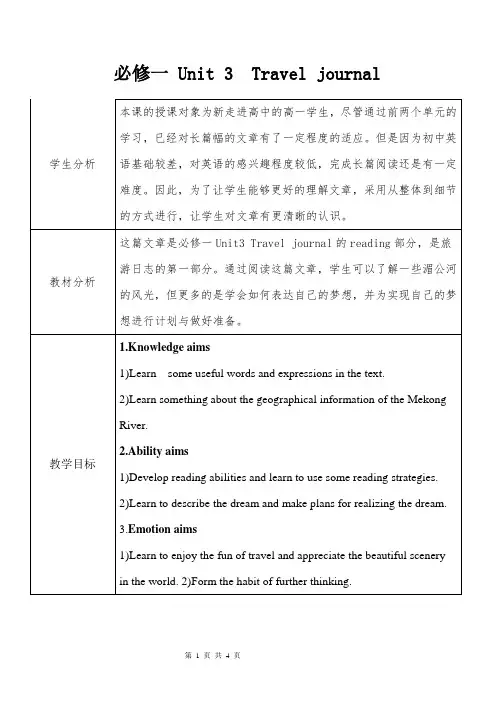
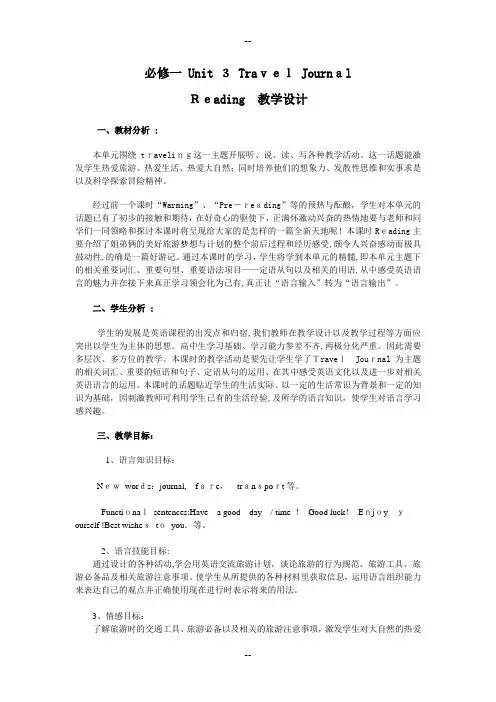
必修一 Unit 3Travel JournalReading 教学设计一、教材分析 :本单元围绕traveling这一主题开展听、说、读、写各种教学活动。
这一话题能激发学生热爱旅游、热爱生活、热爱大自然;同时培养他们的想象力、发散性思维和实事求是以及科学探索冒险精神。
经过前一个课时“Warming”、“Pre-reading”等的预热与酝酿,学生对本单元的话题已有了初步的接触和期待,在好奇心的驱使下,正满怀激动兴奋的热情地要与老师和同学们一同领略和探讨本课时将呈现给大家的是怎样的一篇全新天地呢!本课时Reading主要介绍了姐弟俩的美好旅游梦想与计划的整个前后过程和经历感受,颇令人兴奋感动而极具鼓动性,的确是一篇好游记。
通过本课时的学习,学生将学到本单元的精髓,即本单元主题下的相关重要词汇、重要句型、重要语法项目——定语从句以及相关的用语,从中感受英语语言的魅力并在接下来真正学习领会化为己有,真正让“语言输入”转为“语言输出”。
二、学生分析 :学生的发展是英语课程的出发点和归宿,我们教师在教学设计以及教学过程等方面应突出以学生为主体的思想。
高中生学习基础、学习能力参差不齐,两极分化严重。
因此需要多层次、多方位的教学。
本课时的教学活动是要先让学生学了TravelJournal为主题的相关词汇、重要的短语和句子、定语从句的运用、在其中感受英语文化以及进一步对相关英语语言的运用。
本课时的话题贴近学生的生活实际、以一定的生活常识为背景和一定的知识为基础,因刺激教师可利用学生已有的生活经验,及所学的语言知识,使学生对语言学习感兴趣。
三、教学目标:1、语言知识目标:Newwords:journal,fare,transport等。
Functionalsentences:Have a good day/ time !Good luck!Enjoyyourself !Best wishestoyou.等。
2、语言技能目标:通过设计的各种活动,学会用英语交流旅游计划,谈论旅游的行为规范、旅游工具、旅游必备品及相关旅游注意事项。
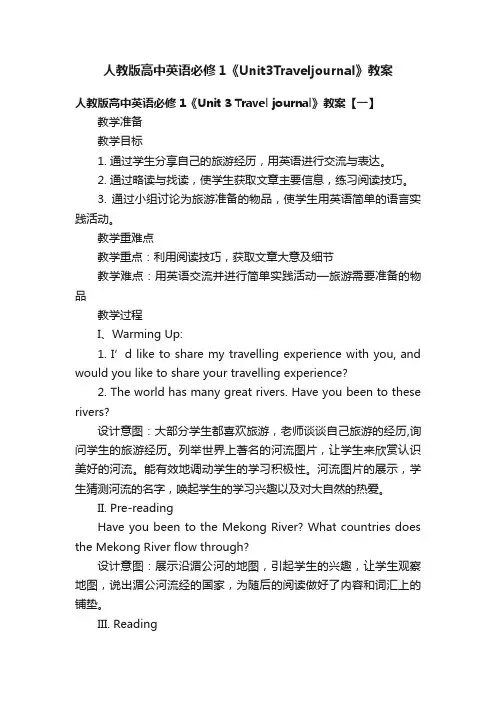
人教版高中英语必修1《Unit3Traveljournal》教案人教版高中英语必修1《Unit 3 Travel journal》教案【一】教学准备教学目标1. 通过学生分享自己的旅游经历,用英语进行交流与表达。
2. 通过略读与找读,使学生获取文章主要信息,练习阅读技巧。
3. 通过小组讨论为旅游准备的物品,使学生用英语简单的语言实践活动。
教学重难点教学重点:利用阅读技巧,获取文章大意及细节教学难点:用英语交流并进行简单实践活动—旅游需要准备的物品教学过程I、Warming Up:1. I’d like to share my travelling experience with you, and would you like to share your travelling experience?2. The world has many great rivers. Have you been to these rivers?设计意图:大部分学生都喜欢旅游,老师谈谈自己旅游的经历,询问学生的旅游经历。
列举世界上著名的河流图片,让学生来欣赏认识美好的河流。
能有效地调动学生的学习积极性。
河流图片的展示,学生猜测河流的名字,唤起学生的学习兴趣以及对大自然的热爱。
II. Pre-readingHave you been to the Mekong River? What countries does the Mekong River flow through?设计意图:展示沿湄公河的地图,引起学生的兴趣,让学生观察地图,说出湄公河流经的国家,为随后的阅读做好了内容和词汇上的铺垫。
III. Reading1. SkimmingSkim the passage and find the main idea for each paragraph Para 1: DreamPara 2: A stubborn sisterPara 3: Preparation设计意图:略读:学生快速浏览课文,寻找相关信息并搭配段落大意。
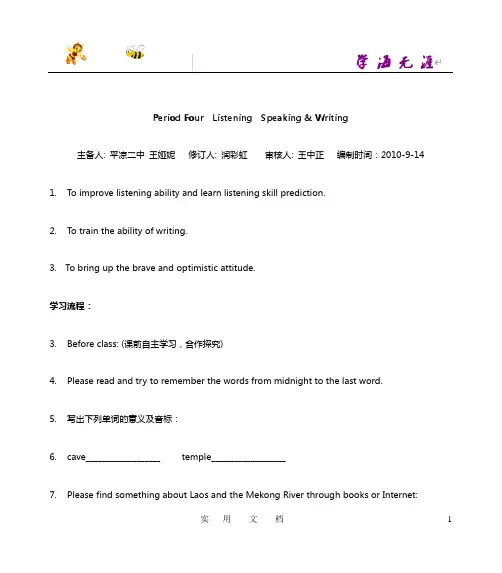
实 用 文 档 1 Period Four Listening Speaking & Writing 主备人: 平凉二中 王娅妮 修订人: 润彩虹 审核人: 王中正 编制时间:2010-9-14 1. To improve listening ability and learn listening skill prediction. 2. To train the ability of writing. 3. To bring up the brave and optimistic attitude. 学习流程: 3. Before class: (课前自主学习,合作探究) 4. Please read and try to remember the words from midnight to the last word. 5. 写出下列单词的意义及音标: 6. cave___________________ temple___________________ 7. Please find something about Laos and the Mekong River through books or Internet: 实 用 文 档 2
8. Customs_______________________________________________________________________ 9. Festivals______________________________________________________________________ 10. Tradition______________________________________________________________________ 11. Food_________________________________________________________________________ 12. Geography_____________________________________________________________________ 13. Mekong River__________________________________________________________________ 14. Others________________________________________________________________________ 15. In class(课上交流展示、研讨提升) 16. Step 1 Check-up and lead in(展示预习成果和导入新课) 17. Ask two of the Ss to give us a short talk about Laos. 18. Step 2 Listening 19. Before you listen, read the exercises below and try to predict what the listening is about. 实 用 文 档 3
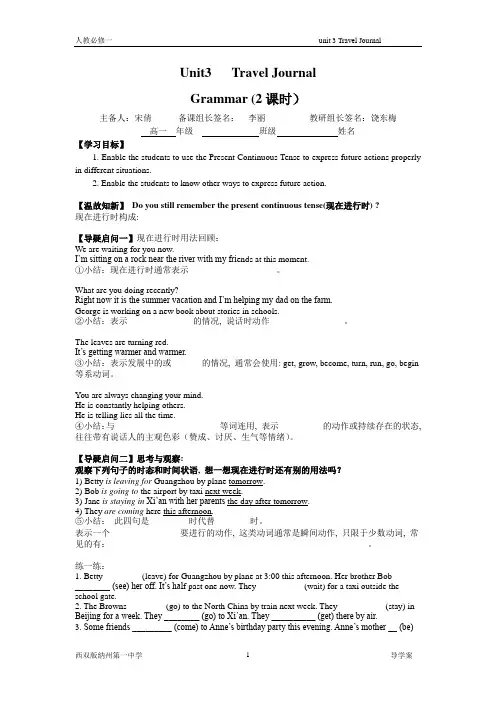
Unit3 Travel JournalGrammar (2课时)主备人:宋倩备课组长签名:李丽教研组长签名:饶东梅高一年级班级姓名【学习目标】1. Enable the students to use the Present Continuous Tense to express future actions properly in different situations.2. Enable the students to know other ways to express future action.【温故知新】Do you still remember the present continuous tense(现在进行时) ?现在进行时构成: _____________________【导疑启问一】现在进行时用法回顾:We are waiting for you now.I’m sitting on a rock near the river with my fri ends at this moment.①小结:现在进行时通常表示____________________。
What are you doing recently?Right now it is the summer vacation and I’m helping my dad on the farm.George is working on a new book about stories in schools.②小结:表示_______________的情况, 说话时动作_________________。
The leaves are turning red.It’s getting warmer and warmer.③小结:表示发展中的或_______的情况, 通常会使用: get, grow, become, turn, run, go, begin 等系动词。
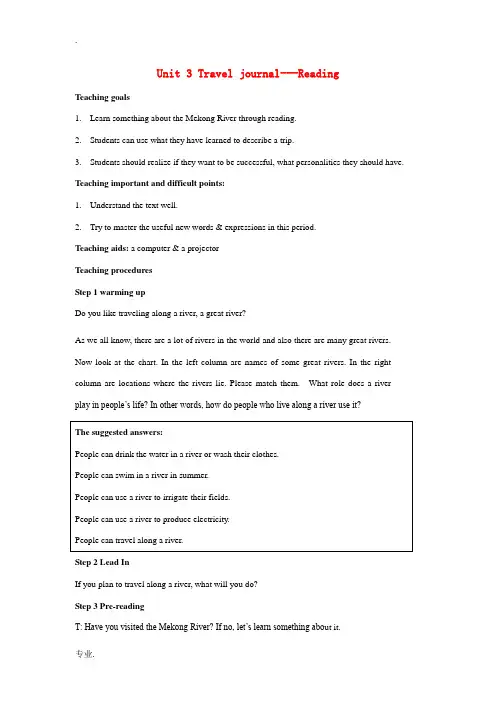
Unit 3 Travel journal---ReadingTeaching goals1.Learn something about the Mekong River through reading.2.Students can use what they have learned to describe a trip.3.Students should realize if they want to be successful, what personalities they should have. Teaching important and difficult points:1.Understand the text well.2.Try to master the useful new words & expressions in this period.Teaching aids: a computer & a projectorTeaching proceduresStep 1 warming upDo you like traveling along a river, a great river?As we all know, there are a lot of rivers in the world and also there are many great rivers. Now look at the chart. In the left column are names of some great rivers. In the right column are locations where the rivers lie. Please match them. What role does a river play in people’s life? In other words, how do people who live along a river use it?Step 2 Lead InIf you plan to travel along a river, what will you do?Step 3 Pre-readingT: Have you visited the Mekong River? If no, let’s learn something abo ut it.Enjoy a clip of video.2. Can you list the countries that the Mekong River flows through?3.Enjoy the beautiful sights along the Mekong River to arouse their interest of it.4.The countries the Mekong River flows throughStep 4 ReadingIn this step, get the students to read the text and finish some tasks.Task1: Scan the text quickly, then answer some questions• 1. Who will travel in the text?• 2. Where are they going ?• 3. How are they getting there?• 4.What did Wang Wei prepare for the trip?1) Two years ago,…bought…2) Then ,…persuaded…3) Last year,…visited…4) Several months before our trip,…went to…•5What didn’t she prepare for the trip?•〔1〕。
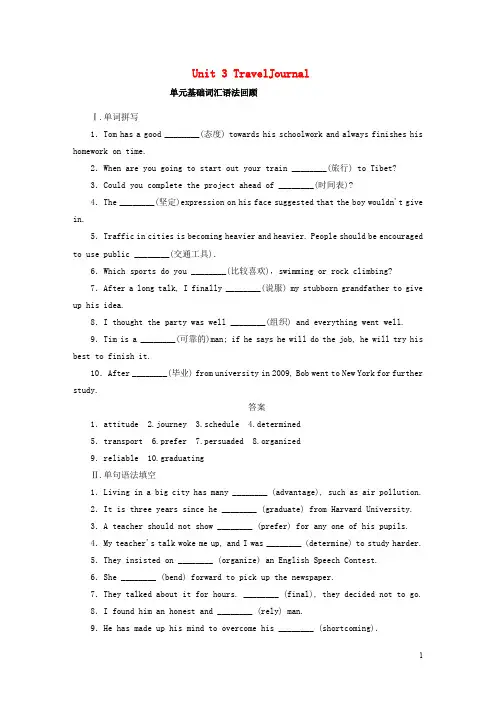
Unit 3 TravelJournal单元基础词汇语法回顾Ⅰ.单词拼写1.Tom has a good ________(态度) towards his schoolwork and always finishes his homework on time.2.When are you going to start out your train ________(旅行) to Tibet?3.Could you complete the project ahead of ________(时间表)?4.The ________(坚定)expression on his face suggested that the boy wouldn't give in.5.Traffic in cities is becoming heavier and heavier. People should be encouraged to use public ________(交通工具).6.Which sports do you ________(比较喜欢),swimming or rock climbing?7.After a long talk, I finally ________(说服) my stubborn grandfather to give up his idea.8.I thought the party was well ________(组织) and everything went well.9.Tim is a ________(可靠的)man; if he says he will do the job, he will try his best to finish it.10.After ________(毕业) from university in 2009, Bob went to New York for further study.答案1.attitude 2.journey 3.schedule 4.determined5.transport 6.prefer 7.persuaded anized9.reliable 10.graduatingⅡ.单句语法填空1.Living in a big city has many ________ (advantage), such as air pollution.2.It is three years since he ________ (graduate) from Harvard University.3.A teacher should not show ________ (prefer) for any one of his pupils.4.My teacher's talk woke me up, and I was ________ (determine) to study harder.5.They insisted on ________ (organize) an English Speech Contest.6.She ________ (bend) forward to pick up the newspaper.7.They talked about it for hours. ________ (final), they decided not to go.8.I found him an honest and ________ (rely) man.9.He has made up his mind to overcome his ________ (shortcoming).10.When you write, it is important to use words ________ (proper).11.My sister is fond ________ going for a walk after supper.12.Her attitude ________ learning English has changed.13.________ (dress) in a new dress, she looks more beautiful.14.Don't give ________ to difficulties, and you will succeed.15.It was my mother ________ put forward a good solution to the problem.16.How I wish I ________ (can) make up for the lost time.17.We found ourselves ________ (cycle) through clouds.18.He was about to close the window ________ a beautiful flower caught his eye.19.Ever since 1990, the Greens ________ (live) a peaceful life in this village.20.She insisted we ________ (keep) pace with society.答案1.disadvantages 2.graduated 3.preference4.determined anizing 6.bent 7.Finally8.reliable 9.shortcomings 10.properly 11.of12.to/towards 13.Dressed 14.in 15.that/who16.could 17.cycling 18.when 19.have lived20.(should) keepⅢ.单句改错1.The scientist prefers going to work on foot every day to drive his car.________ 2.To her great pleasure, it will be less than one year when her son graduates from Beijing University.________3.Once seeing, it is difficult to forget.________4.I don't care the price, so long as the car is in good condition.________ 5.The mother insisted that he finished his homework first, which made his son very angry.________6.That you will succeed in doing the work depends on your attitude to it.________答案1.drive改为driving 2.when改为before3.seeing改为seen 4.care后加about5.finished改为finish 6.That改为WhetherⅣ.语法填空Are you facing a situation that looks impossible to fix?In 1969,the pollution was terrible along the Cuyahoga River near Cleveland, Ohio.It __1__ (be)unimaginable that it could ever be cleaned up. The river was so polluted that it __2__ (actual) caught fire and burned. Now, years later, this river is one of __3__ most outstanding examples of environmental cleanup.But the river wasn't changed in a few days __4__ even a few months. It took years of work __5__ (reduce) the industrial pollution and clean the water. Finally, that hard work paid off and now the water in the river is __6__ (clean) than ever.Maybe you are facing an impossible situation. Maybe you have a habit __7__ is driving your family crazy. Possibly you drink too much or don't know how to control your credit card use. When you face such an impossible situation,don't you want a quick fix and something to change immediately?While there are __8__ (amaze) stories of instant transformation, for most of us the __9__ (change) are gradual and require a lot of effort and work, like cleaning up a polluted river. Just be __10__ (patience).答案1.was 2.actually 3.the 4.or 5.to reduce 6.cleaner7.that/which 8.amazing 9.changes 10.patientⅤ.短文改错(2017·山东淄博市高三阶段性诊断考试试题)Thanks very much for your letter. I'd like to describe my sports dance lessons, which I recent took for the first time.Every lesson starts a warmup and different exercises. We stretch our muscles to prevent injuries or build up stronger muscles, too. After the warmup, our teacher always teaches us the steps we have to dance. For a better understand, we dance these steps without music.To dance for three hours without any break sounds very difficulty but if you enjoy dancing, you'll get used to them. I really love sports dance because I can become very fit while having a fun. Although I have only spent a short times dancing, I feel much healthier and even a little thin now.Did you go in for any sports? I look forward to hearing from you soon.答案Thanks very much for your letter. I'd like to describe my sports dance lessons, took for the first time.which I recentrecentlyEvery lesson startsa warmup and different exercises. We stretch our musclesstartedto prevent injuries orbuild up stronger muscles, too. After the warmup, our teacher and, we dance these always teaches us the steps we have to dance. For a better understandunderstandingsteps without music.but if you enjoy To dance for three hours without any break sounds very difficultydifficult. I really love sports dance because I can become dancing, you'll get used to themitvery fit while having a\ fun. Although I have only spent a short timesdancing, Itimenow.feel much healthier and even a little thinthinneryou go in for any sports? I look forward to hearing from you soon.DidDo单元能力训练与技巧指导Ⅰ.阅读理解APhiladelphia offers a ton of attractions that are suitable for people of every age and here are some familyfriendly attractions.Spruce Street Harbor ParkSpruce Street Harbor Park, one of the best urban beaches in America, is an outdoor heaven on the Delaware River waterfront.Visitors can relax in a hammock (吊床), play on the playgrounds, and play games like table tennis and giant chess.Don't miss out on the park at night, when colorful LED lights hanging from treetops make the entire area bright.Blue Cross RiverRinkOffering ice skating in the winter and roller skating in the summer, Blue Cross RiverRink creates a fun, outdoor experience for the whole family.Visitors can play on the ninehole minigolf course during the summer, and enjoy eats and drinks from the onsite (现场的) bar and restaurant all year round.Sesame PlaceBig Bird, Elmo and the other stars of Sesame Street come out and play at Sesame Place, the only theme park in the nation starring the popular TV show's most lovable characters.A water park, interactive activities, parades, fireworks and shows addto the fun.Once Upon a Nation Storytelling BenchesOn summer days, uniformed and professional storytellers at 13 storytelling benches throughout Philadelphia's Historic District entertain visitors with true, free, three to five minute tales about the colonial (殖民的) era as part of Once Upon a Nation.Children can pick up a Story Flag at any storytelling bench, and then collect a star from every storyteller on their journeys.Flags with all the stars can get free rides on the Parx Liberty Carousel at Franklin Square.语篇解读:本文是一篇应用文。
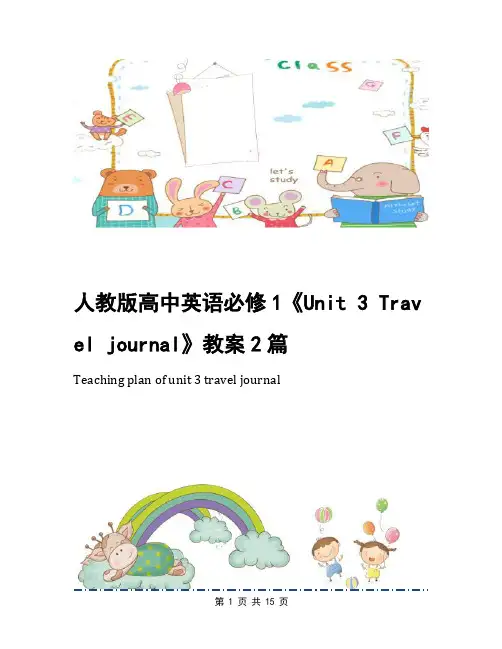
人教版高中英语必修1《Unit 3 Trav el journal》教案2篇Teaching plan of unit 3 travel journal人教版高中英语必修1《Unit 3 Travel journal》教案2篇前言:英语作为在许多国际组织或者会议上都是必需语言,几乎所有学校选择英语作为其主要或唯一的外语必修课。
英语教学涉及多种专业理论知识,包括语言学、第二语言习得、词汇学、句法学、文体学、语料库理论、认知心理学等内容。
本教案根据英语课程标准的要求和教学对象的特点,将教学诸要素有序安排,确定合适的教学方案的设想和计划、并以启迪发展学生智力为根本目的。
便于学习和使用,本文档下载后内容可按需编辑修改及打印。
本文简要目录如下:【下载该文档后使用Word打开,按住键盘Ctrl键且鼠标单击目录内容即可跳转到对应篇章】1、篇章1:人教版高中英语必修1《Unit 3 Travel journal》教案2、篇章2:人教版高中英语必修1《Unit 3 Travel journal》教案篇章1:人教版高中英语必修1《Unit 3 Travel journal》教案教学准备教学目标1.通过学生分享自己的旅游经历,用英语进行交流与表达。
2.通过略读与找读,使学生获取文章主要信息,练习阅读技巧。
3.通过小组讨论为旅游准备的物品,使学生用英语简单的语言实践活动。
教学重难点教学重点:利用阅读技巧,获取文章大意及细节教学难点:用英语交流并进行简单实践活动—旅游需要准备的物品教学过程I、Warming Up:1.I’d like to share my travelling experience with you, and would you like to share your travelling experience?2.The world has many great rivers. Have you been to these rivers?设计意图:大部分学生都喜欢旅游,老师谈谈自己旅游的经历,询问学生的旅游经历。
定语从句复习课学案(一)关系代词:关系副词:一.用适当的关系词填空1.This is the man___________ wants to see you.2.This is the man ____________you want to see.3.He is reading a book__________ was written by John.4.He is reading a book __________ I gave him yesterday.5.He is the person __________ you can turn for help.Summary:先行词是__在从句中做___时用______ 引导,且引导词不能省略。
先行词是__在从句中做_____时用______________ 引导,且引导词可以省略。
先行词是____ 在从句中做__________时用___________引导,且做宾语的引导词可以省略。
但是介词后引导词做宾语时不可以省略。
二、复习whose 引导的定语从句1.I know a man _________ leg was broken.2. Pass me a book ________ cover is green.Whose 引导定语从句时先行词既可以指___也可以指___且在从句中做()。
根据所学知识试做两道高考题:①Children who are not active or _____diet is high in fat will gain weight quickly.(2010北京)A. whatB. whoseC. whichD. that②The old temple_____ roof was damaged in a storm is now under repair.(2010 陕西)A. whereB. whichC. itsD. whose三.关系副词when, where, why引导的定语从句1. Have you ever been to the factory_____ I worked?2. He will never forget the day ______ he joined the army.3. Do you know the reason ______ I left early?试比较得出定语从句解题方法1. This is the town _____ I stayed last year..This is the town _________ I visited last year.2. I will never forget the day _______ I came to school.I will never forget the day ___________ I spent with you.3. This is the reason ____ he was late.This is the reason _________ he told me.总结定语从句解题方法:方法一:先行词是表示地点,时间,原因等名词时用关系代词还是用关系副词不能一概而论得看先行词在从句里的成分来决定。
课堂导学 文本感知 Ⅰ.JOURNEY DOWN THE MEKONG— 1. A.Wang Wei. C.Yu Hang. D.Dao Wei. 答案:A 2.The main idea of the first paragraph is about______
答案:B 3.What’s the opinion of the writer abo A.easy-going
答案:C 4.From the last paragraph,we know that______
C.the Mekong River b 答案:B 5.If you’re required to write another paragraph after the last one,you’ll most _______
B.the contribution of th
答案:D Ⅱ.JOURNEY DOWN THE MEKONG— 1.The sentence “I knew I didn’t need to encourage her.” can make us think______
答案:B 2.Which of the following does the writer like best
答案:D 3.What does the writer use to show the rapid change in weather along the Mekong D.Altitudes. 答案:C 4.From the passage,we can conclude that______
答案:B 5.The next paragraph after this one may refer to______
答案:B 难句透视 1.Since middle school,my sister Wang Wei and I have dreamed about taking a great
Unit 3 Travel Journal
Section III : Journey Down The Mekong (Part 2)
I.课文词汇认知(用下列单词的适当形式填空)
so….. that/ be dressed in/ set/ as usual/ reliable/ view/ fun/put up/at midnight/
flame/ beneath/ temple/ cave
1. They will go home for the Spring Festival ____________.
2. There is a large cave ___________ the mountain.
3. People have different ___________ about it.
4. The young man is __________ and hard-working.
5. The boy ran _______ fast ______ I couldn’t catch up with him.
6. The children had great ________ playing hide-and-seek.
7. At night they ___________ a tent and made a fire.
8. A fire broke out and soon the whole building was in __________.
9. We sat there and watched the sun __________.
10. He was __________ jeans and a T-shirt that day.
II.True or False
1. It is a little cold in Tibet although it is autumn.( )
2. Wang Wei was behind the author as usual. ( )
3. Along the way we hardly met any people. ( )
4. The view of the mountains was so beautiful that it surprised us very much.
( )
5. During the trip we wear caps, coats, gloves all the way. ( )
6. There was almost no wind at midnight. ( )
7. Wang Kun went to sleep and Wang Wei stayed awaked.( )
III. Answer questions according to the text.
1. What did they feel when in Tibet?
2.What did they see in the valleys?
3.What did it look like at midnight?
IV. Fill in the blanks according to the text:
_________ it was autumn, the snow was already beginning to fall in ______.
We looked liked snowmen ________ bicycles. The lakes ______ like glass in the
setting sun and looked wonderful. Wang Wei is _______ and rode in front of me as
usual. As it gradually became warmer, we saw colorful butterflies _______ around
us and many sheep ________ green grass. Travelling in the mountains was
__________.
In the early evening we made ________. After supper Wang Wei went to sleep
but I stayed ________. At ________ the sky became clearer and the stars grew
_______. It was so quiet and there was no_______only the _______ of our fire. As
I lay _______ the stars I thought about how far we had travelled.
Our cousins will ________ us soon. We can________ wait to see them.
V.课文词汇巩固
1. He is a r_________ man. You can ask him for some advice.
2. From the top of the hill, you can get a good v_________ of the whole city.
3. It was only when I felt for a cigarette that I realized I’d left 80 pounds under the
p__________.
4. Though he was badly ill, he went to school as u________.
5. As the bus drove off, it crashed and burst into f_______. Everyone was killed.
6. There are some lines b_________ a zebra’s stomach.
7.I was so tired after a long walk that my legs felt like ____________(石头快).
8.The girl _________________________(穿着红衣服) is easily recognized in the
crowds.
9._________________________(在落日的余晖中) the city looks so beautiful.
10.__________________________(像往常那样)he got up at seven this morning.
11.____________________(在某一点上) of the hill, we got a good view of the
city.
12.At the foot of the hill we began to _________________(扎营).
13.The school _______________(张贴) a notice, announcing the meeting was put
off.
14.He ___________ (放下)his pen, stood up and greeted the teacher.
VI. Recite some good sentences in the text.
1. Our legs were so heavy and cold that they felt like blocks of ice.
2. They were such little white worms that we could hardly see them.
3. To climb the mountains was hard work but as we looked around us, we were
surprised by the view.
4. When I told her that our journey would begin at an altitude of more than 5,000
metres, she seemed to be excited about it.